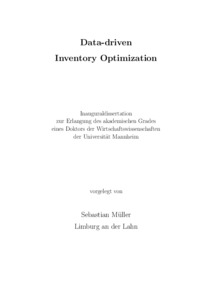|
Data-driven inventory optimization
Müller, Sebastian
![[img]](https://madoc.bib.uni-mannheim.de/57944/1.hassmallThumbnailVersion/Dissertation_final_digital.pdf)  Vorschau |
|
PDF
Dissertation_final_digital.pdf
- Veröffentlichte Version
Download (1MB)
|
|
URL:
|
https://madoc.bib.uni-mannheim.de/57944
|
|
URN:
|
urn:nbn:de:bsz:180-madoc-579442
|
|
Dokumenttyp:
|
Dissertation
|
|
Erscheinungsjahr:
|
2020
|
|
Ort der Veröffentlichung:
|
Mannheim
|
|
Hochschule:
|
Universität Mannheim
|
|
Gutachter:
|
Fleischmann, Moritz
|
|
Datum der mündl. Prüfung:
|
27 November 2020
|
|
Sprache der Veröffentlichung:
|
Englisch
|
|
Einrichtung:
|
Fakultät für Betriebswirtschaftslehre > ABWL u. Logistik (Fleischmann 2009-)
|
|
Fachgebiet:
|
330 Wirtschaft
650 Management
|
|
Freie Schlagwörter (Englisch):
|
inventory management , machine learning , data-driven optimization , Newsvendor
|
|
Abstract:
|
The recent explosion of data availability opens up opportunities for companies to make better decisions. However, it is not clear, in general, how to get from data to a good decision. Exploiting these data for improved decision making requires adequate method- ologies. Inventory management decisions are a particularity important set of decision problems for virtually every company that buys, produces, distributes, or sells physical products. In this dissertation, we investigate the question of how to get from data to a good decision in inventory management problems. To this end, we revisit three fundamental inventory management problems, propose new data-driven methodologies, and measure their impact on inventory performance. Chapter II covers the newsvendor problem. To investigate how to exploit the available data, we propose a framework that distinguishes three levels on which data can generate value. Furthermore, we present a novel solution method that integrates the traditionally separate steps of demand estimation and inventory optimization into a single optimization problem. In our empirical analysis with real-world data, we find that data-driven methods outperform traditional approaches in most cases and that the benefit of improved forecasting dominates other potential benefits of data-driven methodologies. Chapter III is concerned with managing inventories for multiple products in a product category. We present a novel data-driven solution approach based on machine learning that integrates the estimation and opti- mization steps and takes complex substitution effects into account. We evaluate our approach on two real-world datasets. We find that our data-driven approach outperforms the benchmark on the first dataset and performs competitively on the second. Chapter IV focuses on dynamic inventory problems. We propose a novel solution approach that leverages auxiliary data. Our approach divides the problem into multiple single-stage problems using dynamic programming and uses machine learning methods in each stage to improve inventory decisions. In a computational study, we find that our method performs close to the optimal decision and significantly outperforms the benchmark.
|
 | Dieser Eintrag ist Teil der Universitätsbibliographie. |
 | Das Dokument wird vom Publikationsserver der Universitätsbibliothek Mannheim bereitgestellt. |
 Suche Autoren in Suche Autoren in
Sie haben einen Fehler gefunden? Teilen Sie uns Ihren Korrekturwunsch bitte hier mit: E-Mail
Actions (login required)
 |
Eintrag anzeigen |
|
|
